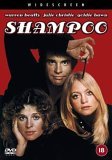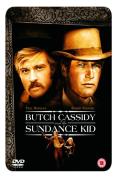![Blazing Saddles [1974]](/pictures/1014417.jpg) Blazing Saddles | DVD | (19/07/2004)
from £6.99
| Saving you £9.00 (128.76%)
| RRP
Blazing Saddles | DVD | (19/07/2004)
from £6.99
| Saving you £9.00 (128.76%)
| RRP The railroad's got to run through the town of Rock Ridge. How do you drive out the townfolk in order to steal their land? Send in the toughest gang you've got...and name a new sheriff who'll last about 24 hours. But that's not really the plot of Blazing Saddles just the pretext. Once Mel Brooks' lunatic film many call his best gets started logic is lost in a blizzard of gags jokes quips puns howlers growlers and outrageous assaults upon good taste or any taste at all! Cleavo
![Butch Cassidy and the Sundance Kid [1969]](/pictures/1003834.jpg) Butch Cassidy and the Sundance Kid | DVD | (17/04/2019)
from £8.25
| Saving you £3.74 (45.33%)
| RRP
Butch Cassidy and the Sundance Kid | DVD | (17/04/2019)
from £8.25
| Saving you £3.74 (45.33%)
| RRP Dating from 1969, Butch Cassidy and the Sundance Kid has never lost its popularity or its unusual appeal as a star-driven Western that tinkers with the genre's conventions and comes up with something both terrifically entertaining and--typical of its period--a tad paranoid. Paul Newman plays the legendary outlaw Butch Cassidy as an eternal optimist and self-styled visionary, conjuring dreams of banks just ripe for the picking all over the world. Robert Redford is his more level-headed partner, the sharp-shooting Sundance Kid. The film, written by William Goldman (The Princess Bride) and directed by George Roy Hill (The Sting), basically begins as a freewheeling story about robbing trains but soon becomes a chase as a relentless posse--always seen at a great distance like some remote authority--forces Butch and Sundance into the hills and, finally, Bolivia. Weakened a little by feel-good inclinations (a scene involving bicycle tricks and the song "Raindrops Keep Falling on My Head" is sort of Hollywood flower power), the film maintains an interesting tautness, and the chemistry between Redford and Newman is rare. (A factoid: Newman first offered the Sundance part to Jack Lemmon.) --Tom Keogh, Amazon.com On the DVD: This anamorphic widescreen print of the 2.35:1 Panavision original looks marvellously crisp, highlighting the sepia tinting and washed-out, over-exposed look of the film nicely and making the best of the deep focus cinematography. The mono soundtrack sounds clean and clear in Dolby 2.0. The commentary track is hosted by documentary-maker Robert Crawford with contributions from George Roy Hill, cinematographer Conrad Hall, and lyricist Hal David (who chips in during the "Raindrops" sequence). The 40-minute documentary dates from 1968 and is narrated by director Hill, who talks in detail about the making-of process, comments on his relationship with the three principals (Katharine Ross was the difficult one apparently), and adds little nuggets such as how they sprayed the bull's testicles to make him charge at the end of the bicycle scene. Also included are a series of absorbing 1994 interviews with all the main players: Newman, Redford, Ross, writer William Goldman, and composer Burt Bacharach. Trailers, Production Notes and an Alternate Credit Roll complete an attractive package. --Mark Walker
![The Man With Two Brains [1983]](/pictures/1036505.jpg) The Man With Two Brains | DVD | (30/01/2006)
from £8.95
| Saving you £5.04 (56.31%)
| RRP
The Man With Two Brains | DVD | (30/01/2006)
from £8.95
| Saving you £5.04 (56.31%)
| RRP Recently widowed world-famous neurosurgeon Dr. Michael Hfuhruhurr (Steve Martin) falls for the charms of gold-digging Dolores Benedict (Kathleen Turner) after accidentally hitting her with his car. Following a life saving operation with his newly developed 'screw-top' brain surgery the pair are soon married but Michael finds himself trapped in a loveless marriage of convenience when he realises that Dolores is only after his money. However on a trip to Vienna to attend a medical
![Blazing Saddles [1974]](/pictures/1016430.jpg) Blazing Saddles | DVD | (02/10/2006)
from £N/A
| Saving you £N/A (N/A%)
| RRP
Blazing Saddles | DVD | (02/10/2006)
from £N/A
| Saving you £N/A (N/A%)
| RRP Mel Brooks scored his first commercial hit with this raucous Western spoof starring the late Cleavon Little as the newly hired (and conspicuously black) sheriff of Rock Ridge. Sheriff Bart teams up with deputy Jim (Gene Wilder) to foil the railroad-building scheme of the nefarious Hedley Lamarr (Harvey Korman). The simple plot is just an excuse for a steady stream of gags, many of them unabashedly tasteless, that Brooks and his wacky cast pull off with side-splitting success. The humour is so juvenile and crude that you just have to surrender to it; highlights abound, from Alex Karras as the ox-riding Mongo to Madeline Kahn's uproarious send-up of Marlene Dietrich as saloon songstress Lili Von Shtupp. Adding to the comedic excess is the infamous campfire scene involving a bunch of hungry cowboys, heaping servings of baked beans and, well, you get the idea. --Jeff Shannon
 Shampoo | DVD | (08/12/2003)
from £14.51
| Saving you £-8.52 (N/A%)
| RRP
Shampoo | DVD | (08/12/2003)
from £14.51
| Saving you £-8.52 (N/A%)
| RRP A modish creation teased into life by Warren Beatty, Shampoo was an offbeat Hollywood hit back in 1975. Made after Watergate, it reflects on the hedonism of late-60s Los Angeles with a sad, somewhat cynical eye. Basically a bedroom farce, fuelled by some famously raunchy dialogue, its comedy is nevertheless underlain with melancholy. Screenwriter Robert Towne was inspired by Wycherly's Restoration comedy The Country Wife, wherein a wily fellow convinces friends of his impotence even while he is merrily seducing their wives. Hence, Towne invented handsome Beverly Hills hairdresser George Roundy (Beatty), who ought to be gay, but emphatically isn't. Shampoo begins on US Election Day, 1968, as Nixon is trouncing McGovern at the polls, and George Roundy is trying to sort his life out. An earnest advocate of sensual pleasure, he beds most of his female clients, from the fretful Jill (Goldie Hawn) to the wealthy Felicia (Lee Grant). Yet George is himself unfulfilled, and imagines that owning his own salon will satisfy him. He asks Felicia's husband Lester (Jack Warden) to back him, but first Lester coerces George into squiring his mistress Jackie (Julie Christie) to a Nixon victory party. Inevitably, Jackie is another of George's girls and, having seduced Felicia's vivacious daughter (Carrie Fisher) earlier that day, George has much to conceal from Lester and Felicia as the evening's festivities unravel. Shampoo shows the 60s turning sour. The characters are rich hippies, superficially liberated but deeply unhappy, and blandly indifferent to the dawning of the Nixon era. The excellent Lee Grant won an Oscar, but Shampoo is Beatty's film. He produced it, had a substantive hand in Towne's script, and deputised the nominal director, Hal Ashby. The film mildly exploits legends of Beatty's real-life sexual prowess, but mainly it embodies his commitment to making thoughtful movies for grown-ups. Richard Kelly
![Paul Newman - Butch Cassidy And The Sundance Kid / The Hustler / The Verdict [1961]](/pictures/1012668.jpg) Paul Newman - Butch Cassidy And The Sundance Kid / The Hustler / The Verdict | DVD | (04/11/2002)
from £N/A
| Saving you £N/A (N/A%)
| RRP
Paul Newman - Butch Cassidy And The Sundance Kid / The Hustler / The Verdict | DVD | (04/11/2002)
from £N/A
| Saving you £N/A (N/A%)
| RRP Butch Cassidy And The Sundance Kid The Sundance Kid is the fastest gun in the West his sidekick Butch is a dreamer always planning that bigger better bank raid. But things are getting tougher and soon the accident-prone anti-heroes decide it's time to head south and disappear into legend... Winner of 4 Oscars including Best Screenplay for William Goldman and Best Song ('Raindrops Keep Fallin' On My Head') and Best Score for Burt Bacharach. The Hustler Paul Newma
 Butch Cassidy/Sundance Kid S. | DVD | (22/05/2006)
from £N/A
| Saving you £N/A (N/A%)
| RRP
Butch Cassidy/Sundance Kid S. | DVD | (22/05/2006)
from £N/A
| Saving you £N/A (N/A%)
| RRP The Sundance Kid is the fastest gun in the West his sidekick Butch is a dreamer always planning that bigger better bank raid. But things are getting tougher and soon the accident-prone anti-heroes decide it's time to head south and disappear into legend. Winner of 4 Oscars including Best Screenplay for William Goldman and Best Song ('Raindrops Keep Fallin' On My Head') and Best Score for Burt Bacharach.
![Shampoo [1975]](/pictures/1014808.jpg) Shampoo | DVD | (13/01/2003)
from £N/A
| Saving you £N/A (N/A%)
| RRP
Shampoo | DVD | (13/01/2003)
from £N/A
| Saving you £N/A (N/A%)
| RRP Shampoo was billed as a sex comedy when it was first released in 1975, cashing in on the priapic reputation of its leading man and producer Warren Beatty. More than a quarter of a century on, that tag looks somewhat inadequate. Against a background of aimless bed-hopping and power-broking, Shampoo satirises the cultural and political wasteland of late-1960s Beverley Hills society. Ladies who lunch are married to ambitious, unfaithful husbands with mistresses; their daughters are dysfunctional; and the mistresses spend more time with their dogs than their lovers. George, the philandering hairdresser, is the common denominator who services them all. But he has private ambitions and is hustling for investment in his own salon. Beatty's restless performance as the man who can't say "no" is intriguing, waking up suddenly and too late to the chaos and vapidity of his life. The humour is bleak, sharpened by the background of Nixon's ascent to the White House: Shampoo is a cynical by-product of the Watergate scandal. There are good performances from Julie Christie and Goldie Hawn as two of George's leading conquests, and from a pre-Star Wars Carrie Fisher as the teenager who tries to seduce him. But Lee Grant garnered the awards as the embittered wife who finally calls "time". On the DVD: Shampoo is presented in 1:85.1 anamorphic widescreen, replicating the glossy production values of the original theatrical experience. The mono Dolby Digital 5.1 soundtrack is well balanced. There are no extras apart from standard subtitles. --Piers Ford
![Blazing Saddles (Deluxe Box Set) [1974]](/pictures/1015668.jpg) Blazing Saddles (Deluxe Box Set) | DVD | (12/08/2002)
from £N/A
| Saving you £N/A (N/A%)
| RRP
Blazing Saddles (Deluxe Box Set) | DVD | (12/08/2002)
from £N/A
| Saving you £N/A (N/A%)
| RRP ![Myra Breckinridge [1970]](/pictures/1013600.jpg) Myra Breckinridge | DVD | (15/08/2005)
from £49.99
| Saving you £-30.00 (N/A%)
| RRP
Myra Breckinridge | DVD | (15/08/2005)
from £49.99
| Saving you £-30.00 (N/A%)
| RRP Everything you heard about Myra Breckinridge is true! In this off-the-wall cult classic from the pen of Gore Vidal Myron Breckinridge goes to Europe to have a sex change and comes back to America as the sexy man-hating Myra...

Please wait. Loading...
This site uses cookies.
More details in our privacy policy